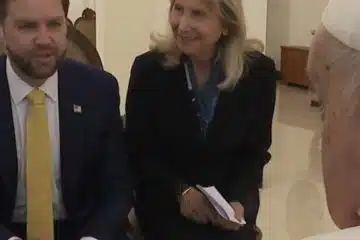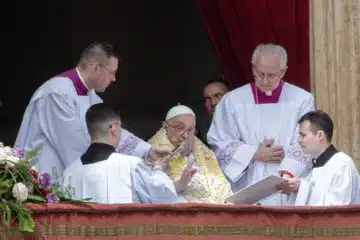Bishop-elect Fernandes: Looking Forward
 For many dioceses, a new bishop means a transfer: the bishop moves from one diocese to another. But for others, like the Diocese of Columbus, their new bishop is a priest who must first be ordained to the episcopacy. That is the case for Bishop-elect Earl K. Fernandes, whose episcopal ordination will be held on May 31.
For many dioceses, a new bishop means a transfer: the bishop moves from one diocese to another. But for others, like the Diocese of Columbus, their new bishop is a priest who must first be ordained to the episcopacy. That is the case for Bishop-elect Earl K. Fernandes, whose episcopal ordination will be held on May 31.
However, because Bishop-elect Fernandes is new to being a bishop doesn’t mean he’s unprepared. Years of service as a priest in a multitude of roles taught him to adapt and grow. In particular, Bishop-elect Fernandes believes his work as a chaplain at Lehman Catholic High School, as a pastor at multiple parishes, and for the apostolic nuncio’s office collectively prepared him to be Columbus’ next bishop.
CHAPLAINCY
“I don’t know that you’re ever prepared [to be a bishop], but I think one of the things with being a high school chaplain is it keeps you in touch with young people who are not just the future of the Church, they’re the Church now, and [it keeps you in touch with] keeping them connected to the Church by showing interest in them. There’s interest in them in the classroom, but there’s an interest in them outside of the classroom, showing up at basketball games and football games. And it means the world to them that you’re interested in their life,” said Bishop-elect Fernandes.
He continued, “I thought if I can be interested in them, then maybe they’ll be interested in the Church. And so I learned a lot about their enthusiasm for life, ways to be creative. … I can’t be like a young person. I’m not going to be a young person ever again. And sometimes young people need an adult in the room. They need a father figure. But to know that their father loves them is important.”
PASTOR
When it comes to takeaways from being a pastor, Bishop-elect Fernandes holds as crucial several components he hopes will help him be a good bishop: caring for priests, listening to the faithful and fostering a support team.
“I’ve learned how hard it is to be a pastor. … You won’t keep everyone happy. It’s impossible to do so. You do the best that you can. And I happen to be a relatively young pastor with a lot of energy and intellectual gifts. And now we’re asking our priests and our pastors to take on still more. And some of them are older or have health problems. … It’s taught me to be patient with my brother priests, to be more sympathetic and empathetic toward them. And so hopefully, as a bishop, I want to stay close to priests and make sure that the morale is OK, because if their health and their morale are not OK, then they won’t give the joyful witness that the people of God need that would attract people to the faith,” said Bishop-elect Fernandes.
He continued, “I think the second thing I’ve learned about being in a parish is that you have to listen to people. I came into a situation where the previous pastor had been removed and. … I met with 70 families just to talk to them and listen to them, explain things to them, hear from them. For some people it worked, with others it didn’t necessarily work, but you at least get a sense of where they’re at. And people have a need to be heard, and so we shouldn’t discount them.”
“I think a third thing with working in a parish is that you realize you have to work as a team. I am blessed with a good staff, but also building up the staff morale, not overworking the staff, trying to get them to gel together to work together. … That same sense of collaboration happens with the Parish Council and worship commission, and I can see how lay people have a lot of gifts which they can offer – some priests would feel threatened by that. I myself don’t. I can’t do everything and I’m not an expert in everything. And so I need to rely on their expertise. … And together we work to come up with best practices and what’s going to be in the best interest of their parish. Priests come and go, but the parish lives on,” he said.
NUNCIATURE
During his time at the apostolic nuncio’s office in Washington D.C., Bishop-elect Fernandes was at the hub of all things bishop-related. He heard, read and listened to complaints, and stayed attuned to problems in both the American and worldwide Church.
“I learned, with respect to the nunciature, how hard it is to find good bishops and candidates for bishops. How hard it is to be a bishop, because we get all the complaint letters about all the bishops, as well as bishops calling us to say, ‘I’ve got this issue with these clergy. I’ve got this issue with these finances. I’ve got this issue with the sexual abuse. What do I do?’ And you learn, sometimes from their mistakes, even what to do, what not to do, what to say, what not to say. You learn how to not panic.
… You learn that sometimes they don’t know what to do, but [think], “Maybe I should call the apostolic nuncio. Maybe he would have some advice. Or maybe I should call the metropolitan archbishop and see what he has to say. You learn how to work in a collegial fashion,” Bishop-elect Fernandes said.
He continued, “I also think I gained a great sense of the universal nature of the Church because [Apostolic Nuncio] Archbishop Pierre and the other Vatican diplomats had been stationed all over the world. So you learn about different issues in different countries and what’s going on and who you need when you see something come up – in Rome, who you need to contact and how this actual process works.”
Bishop-elect Fernandes laughed as he held up his pointer finger and thumb to show about an inch of space, “But that means I know about this much about being a bishop.”
LOOKING FORWARD
As he prepares to lead the Diocese of Columbus, Bishop-elect Fernandes is already thinking about what comes next.
“I really want to come to know the people, the priests, the religious of the Diocese of Columbus, as well as the city. And I want to say to the people in the rural areas in the Diocese of Columbus, ‘I’m not going to neglect you.’ I think my experience having served in Sidney, Ohio, tells me, ‘Hey, these people have great faith and we can’t just let them go by the wayside because they’re far away. We have to provide for their spiritual needs.’”
He continued, “But difficult choices will have to be made. I know, for example, Columbus has no priestly ordinations this year and there’s only one for the next year. So we’re going to have to build a culture of vocations.”
“I’m convinced that our problems in life never go away. But the way we confront those problems is different because of our faith in Jesus Christ. And so to foster people’s relationship with Jesus, I think it’s going to be an important thing to do.”
This article appeared in the June 2022 edition of The Catholic Telegraph Magazine. For your complimentary subscription, click here.












